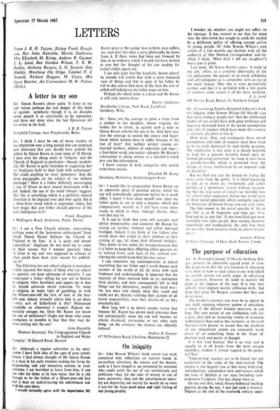Sir: In reviewing Pamela Hansford Johnson's hook On Iniquity, John
Rowan Wilson (10 March) says that most ordinary people feel 'that the intellectual leaders of our society have with great brilliance and ingenuity destroyed most of the moral assumptions and rules of conduct which have made this country a relatively safe place to live in.'
How weak, then, and inadequate those moral assumptions and rules of conduct must have been to be so easily destroyed by such brittle weapons. The implication is that since it is clearly hopeless to look for a genuine morality based upon in- formed personal conviction. we must at least have a pseudo-morality which is protected from the attacks of clever intellectuals by an imposed code or 'discipline.'
But we shall not cure the disease by hiding the nasty sores from the public It is blind hypocrisy to talk as so many do, emotionally and rather loosely, of a 'permissive' society without recognis- ing that the real cause of today's lax morality was itt2 almost total suspension during two world wars of those moral principles which normally regulate the behaviour of human beings towards each other.
The true answer to the moral anarchy of 'do as you like' is, as St Augustine said long ago, 'love God and do as you like.' If you love God you must inevitably love other people. thus creating, however imperfectly and inadequately, the only true basis for morality. Such morality needs no censor to pro- tect it.






























 Previous page
Previous page